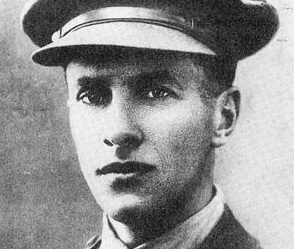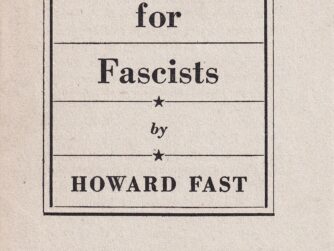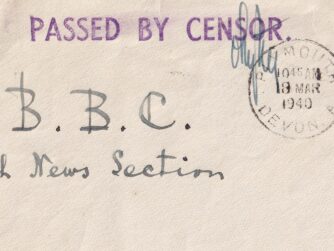A commentary by Ted Lipien for the Cold War Radio Museum
In doing historical research, I found a few indirect links between one of Joseph Stalin’s greatest apologists, the New York Times Pulitzer Prize-winning Moscow correspondent in the 1930s Walter Duranty, and the Voice of America (VOA), the international radio broadcasting station, which since 1942 until 1945 was managed by pro-Soviet U.S. government officials in the Office of War Information. President Truman abolished the Office of War Information in 1945 and transferred VOA to the State Department. In 1953, VOA was placed in the newly established U.S. Information Agency (USIA). In 1999, VOA was moved to the Broadcasting Board of Governors (BBG), an independent federal agency, which changed its name in 2018 to the U.S. Agency for Global Media (USAGM).
In March 1939, Walter Duranty wrote in a letter to his American journalist friend John Gunther that he was angered by the Herald Tribune‘s decision to pull Joseph F. Barnes out of Moscow. Duranty thought very highly of Joe Barnes, describing him to Gunther as a journalist
who knows more about it [the Soviet Union] than anyone and was the best friend I had here, and lived quite near me.1
In November 2003, the Pulitzer Prize Board voted not to revoke Walter Duranty’s Pulitzer Prize despite his pro-Soviet propaganda and lies about the Stalin-engineered famine in Ukraine that took millions of lives in the 1930s.2 The 2002-2003 Pulitzer Prize Board membership reads like a Who’s Who of the American media, academia, and intellectual establishment.3
Because of the decades-long suppression of information about the Soviet propaganda influence, at least some of those Pulitzer Prize Board members who had voted in 2003 not to strip Walter Duranty of his Pulitzer Prize and later attained positions of leadership in the U.S. government’s international broadcasting may have been unaware of the entire history of Stalin’s Great Terror, the Ukraine famine, and the Duranty-led attack on Welsh reporter Gareth Jones, one of the few journalists who was telling the truth about the Holodomor extermination of peasants of Ukrainian, Russian, and other nationalities. Joining Duranty in his attack on Jones were other elite American and British correspondents in Moscow.
One of them, Eugene Lyons, revealed later in his 1937 book Assignment in Utopia that they had all deliberately lied about the imposition of Soviet rule, the Ukrainian famine, and Gareth Jones.4
Duranty’s friendship with Joseph Barnes developed somewhat later, but, like Duranty, Barnes also became an apologist for the Stalinist regime in Russia. He later served as one of the chief first officials in charge of the wartime Voice of America until he was forced to resign by the already highly pro-Soviet Roosevelt administration for being excessively pro-Soviet in a scandal that erupted in 1943 when VOA called King Emmanuel of Italy a “moronic little king.”
President Roosevelt’s close personal friend and foreign policy advisor, Under Secretary of State Sumner Welles, warned the FDR White House in April 1943 about Barnes:
It is reliably stated that there has been no crucial point in Russian development, since 1934, when Barnes has not followed the Party line and has not been much more successful than the official spokesman in giving it a form congenial to the American way of expression.5
In 1940, as the acting Secretary of State, Welles issued the Welles Declaration, which condemned Soviet occupation of the Baltic states: Lithuania, Latvia, and Estonia.
Welles’s 1943 secret memorandum to the White House also led to the forced resignation of John Houseman, the Voice of America’s first chief radio producer, who later somewhat erroneously was declared VOA’s first director. Houseman had no journalistic experience and reported to Joseph Barnes, who reported to Robert E. Sherwood, OWI deputy director and FDR’s speechwriter. Welles informed the White House that the State Department would not issue a U.S. passport to Houseman for official travel abroad because, among other things, he was hiring Communist Party members for VOA jobs. Houseman resigned in mid-1943. Houseman’s protege, Howard Fast, VOA’s first chief news writer and editor, who in 1953 received the International Stalin Peace Prize and was a Communist Party member, was similarly forced to resign in early 1944 when the State Department refused to give him a U.S. passport for official VOA travel abroad.
Barnes’s forced resignation in early 1944 happened because of the Voice of America’s “Moronic Little King of Italy” broadcast about Italy’s King Emmanuel. The VOA insult inspired by Soviet propaganda put U.S. diplomacy and American soldiers at risk and angered President Roosevelt and General Dwight D. Eisenhower.6
NOTES:
- S. J. Taylor, Stalin’s Apologist: Walter Duranty, The New York Times’s Man in Moscow (New York: Oxford University Press, 1990), p. 280. Waler Duranty to John Gunther, 2 March 1939, Personal Files of John Gunther.
- Pulitzer Prize Board, “Statement on Walter Duranty’s 1932 Prize,” November 20, 2003, https://www.pulitzer.org/news/statement-walter-duranty.
- Pulitzer Prize Board 2002-2003, https://www.pulitzer.org/board/2003.
- Eugene Lyons, Assignment in Utopia (New York: Harcourt, Brace & Company, 1937), p. 575.
- State – Welles, Sumner, 1943-1944, From Collection: FDR-FDRPSF Departmental Correspondence, Series: Departmental Correspondence, 1933 – 1945 Collection: President’s Secretary’s File (Franklin D. Roosevelt Administration), 1933 – 1945, National Archives Identifier: 16619284.
- Dwight D. Eisenhower, The White House Years: Waging Peace 1956-1961 (Garden City: Doubleday & Company, 1965) 279.








